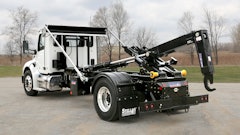Demonstrating a commitment to sustainable manufacturing and environmental stewardship, The Grasshopper Company, manufacturer of commercial zero-turn mowing equipment, received a 2012 Pollution Prevention (P2) Award from the Kansas Department of Health and Environment (KDHE) during a ceremony at the 2012 Kansas Environmental Conference in Wichita.
KDHE selected Grasshopper for the company’s implementation of high-precision laser technology, the nesting software that runs it, and inspection tools that eliminate variance.
“We recognize our responsibility to provide products that are not only environmentally friendly, but are produced in an environmentally sustainable way,” says Stan Guyer, president of Grasshopper. “We continually evaluate and improve processes to reduce our impact on the environment, both at our manufacturing facilities and with our products in the field.”
These new processes helped the company reduce consumption of raw steel in manufacturing last year by more than 142 tons while increasing precision and product durability. In addition, Grasshopper’s reuse of scrap metal in other production processes reduced raw material consumption by an additional 168 tons. The P2 Award also acknowledges Grasshopper’s MaxTorque Clean Diesel education campaign, which helps landscape professionals reduce emissions and carbon footprints by promoting sustainable lawn care and use of clean-operating, long-life equipment.
To learn more about Grasshopper’s commitment to sustainable lawn care practices, an in-depth website, white paper study and a Fuel & Emissions Calculator for commercial mowing equipment can be found at http://www.grasshopperfuelsavings.com. Landscape professionals can learn how to reduce fuel consumption, limit emissions and decrease long-term demand on natural resources while increasing revenues and profitability.



















